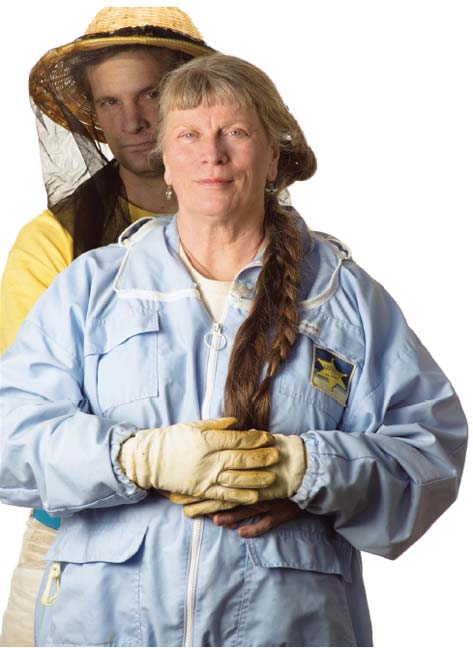 Brandon and Susan Pollard
Brandon and Susan Pollard
Photography by Danny Fulgencio
When I was young, my parents had a honeysuckle bush outside our front door. The plant attracted a lot of bees. I hated it. I remember having to ward off the buzzing warriors when I got home from school. I was stung only once, but I could not forgive. I prayed for them to just go away. I have since regretted my secret holy war on our bees. As is the case with many small and subtle things, I failed to grasp their significance. Honeybees are a big deal. Unlike mosquitoes, where I have yet to see their value, honeybees carry their own weight. Bees do not receive entitlements; they are hard workers, job creators. And we need them.
In 2010, a study at Cornell University estimated honeybees provide $14 to $15 billion annually to American agriculture. While traveling across the heartland, honeybees pollinate 80% of all flowering crops, which allows those crops to flourish—that accounts for one-third of everything we eat. If the apis workers were to go on strike, it would devastate the production of apples, apricots, okra, almonds, strawberries, asparagus, beets, turnips, blueberries, cucumbers, peaches, pears, avocados and raspberries, to name a few items from your grocery list. Some studies also project that losing be e-dependent crops could cripple the beef and dairy industry. Many of the restaurants we love in North Texas would be reduced to a menu of water, corn, sugar and potatoes— a horrifying challenge for any chef. This dire prognostication doesn’t even take into account any additional unintended consequences that could result from such a shift in our ecosystem. It’s hard to comprehend that bees bear such a heft y load.
Here’s where it gets apocalyptic—like the Mayans, the bees are disappearing without clear explanation. It’s a phenomenon known as “colony collapse disorder.” Bees are diminishing at a rate of approximately 30% each year since 2007, according to a report from the USDA. Theories abound as to why it’s happening at such an alarming rate. Researchers speculate the use of pesticides and toxins in combination with other stresses—mites, pathogens, loss of habitat, climate change—are compromising the bees’ immune system. The bee population has dwindled so much that migratory beekeepers have found it difficult to keep up with agricultural demand.
Honeybees are an indicator species. These angels of agriculture are the messengers. Bees are sensitive to slightest shift s and vibrations of their surroundings and act as a warning that something is out of balance in our ecosystem. When the bees are dying, something is wrong.
This is what concerns Susan and Brandon Pollard. A decade ago, they founded the Texas Honeybee Guild, establishing honeybee sanctuaries throughout the region. They believe that education is the key to the beleaguered bee’s survival. While beekeeping is their vocation, their mission is to protect our area’s pollinators. They describe themselves as both bee-wranglers and bee-vangelists. A few months ago, I met the couple for breakfast at Garden Café in East Dallas to discuss their work.
Brandon is a former professional soccer player. He’s scruff y with the wild hair of a male model. Susan has a gentle countenance, long hair and is adorned in bee-themed jewelry. Their collective fashion sense could be described as comfy and bundled—plaids, fl oral prints, knit caps, and a mishmash of soft colors. Wife and husband are intentionally offbeat, playfully serious and unconsciously kind. They are easy to talk to and challenging to interview. Their “green” spirituality encompasses honeybee rescues, love, urban AGtivism, Slow Foods and poetry. With both Susan and Brandon, every sentence is laced with the mention of bees and friends and guild supporters. I have no idea who these people are and it doesn’t matter. They are part of the Pollards’ hive.
“Everywhere I go, I see what we started,” Susan said. “Our work is really taking root.”
This is not an exaggeration. They have over 100 apiaries throughout the Dallas area – located in backyards, community gardens, at Paul Quinn College and on top of the Fairmont Hotel. That’s several million bees under the nurturing wing of the Texas Honeybee Guild. If you see a bee in Dallas, it may well know Susan and Brandon.
Susan and Brandon make a modest income from the honey, which they sell in stores like Eatzi’s, Bolsa Mercado, Natural Grocers and Green Grocer and through Artizone and Greenling delivery services. FreshPoint bridges honey to chefs who proudly feature it on their menus. The sale of their signature Zip Code Honey from select North Texas zip codes helps fund education programs. Consumers can purchase honey made from nectar gathered in his or her own backyard. Literally. Local raw and unfiltered honey is a good way to treat allergies.
Tirelessly, they speak on the bee’s behalf at schools, libraries, garden clubs, at nature centers like Trinity River Audubon Center and Texas Discovery Gardens, and at larger venues like the State Fair of Texas and the Fort Worth Stock Show. At the center of their presentation is a traveling observation hive offering a see-through glass view of the queen, her workers and drones. Every Saturday and Sunday, they set up at farmers markets—Dallas Farmers Market and White Rock
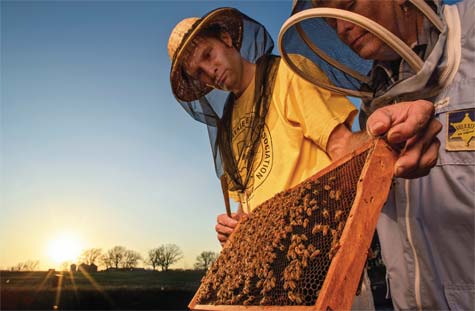
“At first, we were perceived as tree huggers,” Susan said. “We’re just stewards of our elements. That’s all it is.”
The deeper mission is conservation of the bee population, and they seek help where they can. “We’re driven to integrate,” Brandon said. Susan locked pinkies with me, leaned forward, and with our foreheads almost touching, she said, “There, now you’re a member.”
In January, the Dallas County Health and Human Services’ Public Health Advisory Committee held its quarterly meeting presided over by committee chairman County Commissioner John Wiley Price. The main agenda item was to evaluate last year’s West Nile Virus epidemic and recommend a response plan for this upcoming summer. Last summer, as trucks and planes navigated throughout Dallas gassing mosquitoes, Susan and Brandon were buzzing around town to save their apiaries. It was a massive effort, even with the help of an army of volunteers.
“We didn’t sleep for three months,” Susan said.
They won’t know the full damage from the pesticides until the bees emerge from the colder months. While the spraying may not have killed all the bees immediately, it weakened them going into winter, a precarious time in the bee’s cycle. Brandon thinks they may have lost 50% of their bees.
And if we bite, or spray, or blast the wings that feed us, the pollinators? Susan summed it up in two words. “Intense stupidity.”
Brandon, Susan and fellow volunteers—environmental experts, local farmers and a scientist— attended the January meeting. As the newest pinky-sworn member of the Texas Honeybee Guild, I joined them. Dr. Wendy Chung, the county’s chief epidemiologist, gave a power point presentation to indicate the severity of the West Nile Virus last year. She spoke clearly and quickly, keeping her eyes fixed on the screen. She flew through the charts and graphs, doing her best to unpack the numbers and the jargon. (The spraying was referred to as “environmental mitigation.”) The conclusion? It was bad last year, really bad. The line graphs all leap in 2012. Then Dr. Christopher Perkins, medical director of Dallas County Health & Human Services, presented the response plan for 2013, which mirrored the state’s plan.
There was a brief discussion. The vague wording was questioned, and concern expressed about whether aerial spraying should take place at level three, public health warning, or level four, public health emergency. Commissioner John Wiley Price cut off the discussion to keep everyone on task. The plan was approved. Several muttered an “aye,” two quietly abstained from voting, and there was only one “nay.”
Price allowed citizens to speak. One woman echoed concern about the vagueness of the wording. Price cut her off. Another woman was worried about the effects of aerial spraying on children and the elderly. “Aerial spraying is last in our arsenal,” Price reiterated. He said that the spray effects were “not their department,” and that it fell under Poison Control, but he promised to consult their attorneys to make sure. This was not the first time Price had heard these concerns. In the end, Price reminded the guests that they needed to put their concerns in writing and send them to him—which they have done and will continue to do.
After the meeting, Susan was upbeat. She noted that Price’s irritation proved the message was getting out there.
“We’re going to work this out.”
Why should we care about the bee? Why should we announce amnesty for the honey maker, to proclaim pollination not pollution on our mutual habitat? That intrepid stinger once made me curse bees. It’s a slight fault on an otherwise noble creature. We should forgive them their weapon, so rarely used and often at their own peril, and instead grant them privileged status as a remarkable arthropod. As beautifully and gracefully patterned as the butterfly, buzzing as melodious as the locust, and engineering feats as miraculous as Charlotte and her web, the bee deserves our protection.
For more info about the Texas Honeybee Guild, see their page on Facebook.
HONEY RECIPES
GRAIN MUSTARD HONEY VINAIGRETTE
HONEY & GINGER COLD-FIGHTING TEA
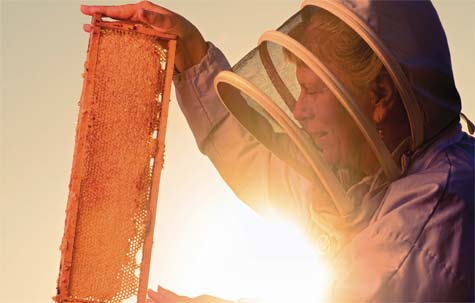
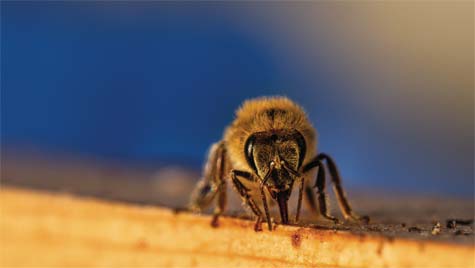
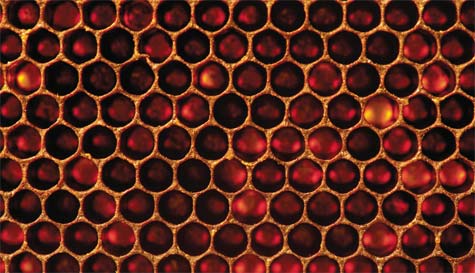
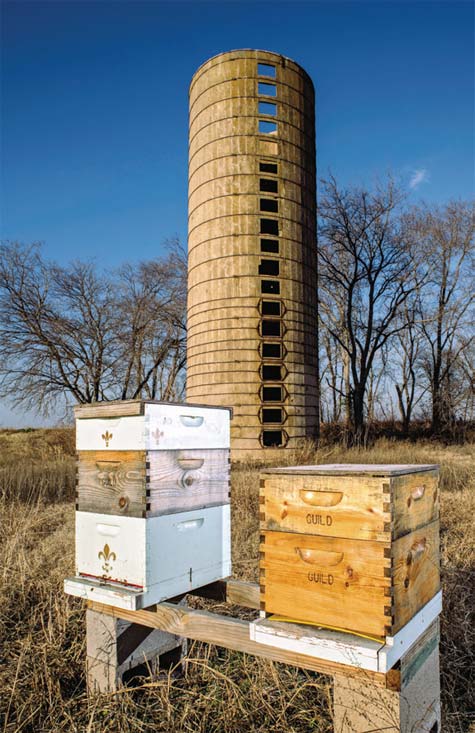
DAVID HOPKINS is a freelance writer — a regular contributor to D Magazine, Smart Pop and The Two Man Game. He has also written comic books and graphic novels in a variety of genres. For twelve years, he taught English and Creative Writing at Martin High School where he served as a writing coach for interscholastic competitions. David lives in Arlington, Texas with his wife April, daughter Kennedy, and his dog Berkeley.
- David Hopkins
- David Hopkins





